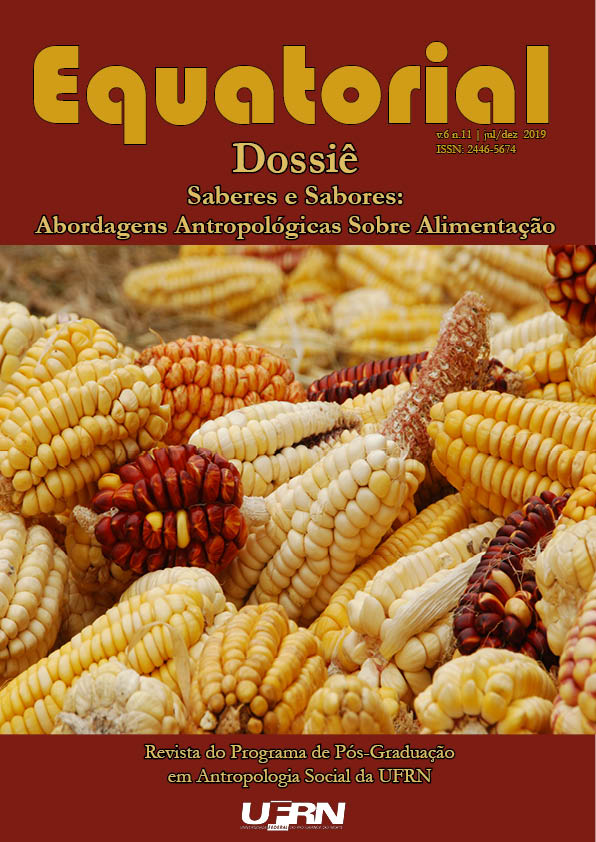Teranga food:
the food as a translation of the processes of religious transnationalization among Senegalese in Porto Alegre.
DOI:
https://doi.org/10.21680/2446-5674.2019v6n11ID16741Keywords:
food anthropology, food, migration, religious transnationalism, mouridismAbstract
The following article brings a cliping of field work among Wolof Senegalese migrants in Porto Alegre. Considering food as an aspect that goes beyond the biological scope, but mainly, which translates much of our cultural elements, we bring a narrative of the celebration of the Grande Magal de Touba, held in the capital of the state of Rio Grande do Sul on November 8, 2017. The event is configured as the largest and most traditional of the Islamic line practiced by the Senegalese in Porto Alegre. As we shall see, the space of this celebration, through food, decodes and communicates various aspects of Senegalese society and of Mouride Islam.
Downloads
References
Referências
ASAD, Talal. “A construção da religião como uma categoria antropológica”. In: Cadernos de Campo, V. 19, n. 19, 2010, p. 263-284.
CAGLAR, Ayse. McDoner: Doner Kebap and the social positioning struggle of German Turks. London: Sage, 1995.
CAPONE, Stefania; MARY, Andre. Las traslogicas de una globalización religiosa a la inversa. In : Argyriadis, K. Capone, S., De La Torre, R. (Ed). En sentido contrario. Transnacionalización de religiones africanas y latinoamericanas. Mexico, CIESAS, 2012, p. 27-48.
CARRASCO I PONS, Sílvia; DIEZ GARCIA, Rosa Wanda. Pontos de partida teórico metodológicos para o estudo sociocultural da alimentação em um contexto de transformação. In: Coleção antropologia e saúde. Fiocruz, 2005. p. 101-126.
CONTRERAS, Jesús; GRACIA, Mabel. Alimentação, sociedade e cultura. Fiocruz, 2011, p.7-108.
CSORDAS, Thomas. Transnational Transcendence. Essays on Religion and Globalization. Los Angeles, University of California Press, 2009 (introdução).
DOUGLAS, Mary. As abominações do Levítico. In: Pureza e Perigo. São Paulo, Perspectiva, 1966.
________. Les structures du culinaire. Communications, 31,1979.
________. Deciphering a meal.Daedalus, 1972, p. 61-81.
ESPEIORIN, Vagner. A nova cara do imigrante. Revista UCS, Caxias do Sul, maio 2014. Disponível em: <https://www.ucs.br/site/revista-ucs/revista-ucs-11a-edicao/senegal-a-nova-cara-doimigrante/>. Acesso em 21 de agosto de 2017.
FAVRET-SAADA, Jeanne. “Ser Afetado”. In. Cadernos de Campo, n.13, 2005,p.155-161.
GOODY, Jack. Panorama general. Cocina, cuisine y clase: estudio de sociología comparada. Barcelona: Gedisa, 1995.
HARBOTTLE, Lynn. Fast food/spoiled identity: Iranian migrants in the British catering trade. In: Food, health and identity, 1997, p. 87-110.
INGOLD, Tim. Chega de etnografia! A educação da atenção como propósito da antropologia. Educação, v. 39, n. 3, 2016.
IMILAN, Walter. Performing national identity through Peruvian food migration in Santiago de Chile. Fennia- International Journal of Geography. V. 193, n.2, 2015, p.227-241.
ISHIGE, Naomichi, O homem, o comensal. O Correio da UNESCO – O Sal da Terra, Alimentação e Culturas. Edição Brasileira, FGV, Julho, 1987, ano 15, n° 7.
JARDIM, Denise Fagundes. O projeto migratório palestino: uma releitura de narrativas e conflitos intrafamiliares em uma perspectiva etnográfica. História oral: revista da Associação Brasileira de História Oral. Recife, PE. Vol. 18, n. 1, 2015, p.63-92.
LÉVI-STRAUSS, Claude. O triângulo culinário. Estructuralismo y dialéctica, 1968, p.39-57.
MACIEL, Maria Eunice. Identidade cultural e alimentação. In: DIEZ GARCIA, Rosa Wanda. Coleção antropologia e saúde. Fiocruz, 2005. p. 49-55.
MANÉ, Djiby. Gênero e sociedade patriarcal no Senegal: uma análise da obra Riwan, de Ken Bugul. Revista Alpha, Patos de Minas, 18(1), jan./jul. 2017, p.147-163.
MARQUES, Vera Lúcia Maia. Os muçulmanos no Brasil. Etnográfica. Revista do Centro em Rede de Investigação em Antropologia, v. 15, n. 1, 2011,p. 31-50.
MARY, Andre. Introdução. Os antropólogos e a religião. Aparecida, Editora Ideias e Letras. 2015.
MENASCHE, Renata; ABDALA, Mônica. Apresentação-Comida e Gênero: repensando teorias e práticas. Caderno Espaço Feminino, v.19, n.01, Jan./Jul. 2008
MINTZ, Sidney. Comida e Antropologia: uma breve revisão. Red Revista Brasileira de Ciências Sociais, 2000.
MONTANARI, Massimo. Comida como cultura. São Paulo: editora SENAC São Paulo, 2008.
MORENO MAESTRO, Susana. La Cofradía Mouride en la emigración senegalesa:¿ agente de desarrollo?. In: Culturas y desarrollo en el marco de la globalización capitalista.[X Congreso de Antropología, Sevilla, 2005]. Fundación El Monte, 2005, p. 199-216.
________. Mujeres senegalesas y economía informal en Sevilla: repercusiones en los roles de género. Actas del I Congreso Internacional sobre Género, Trabajo y Economía Informal. Universidad Miguel Hernández. Elche, 27-29 febrero 2008.
RODRIGUES, Heloisa de Almeida. “Alimentação como fonte de sociabilidade e de hospitalidade”. In: SINAIS – Revista Eletrônica. Ciências Sociais. Vitória: CCHN, UFES, Edição n.12, v.1, Dezembro 2012, p. 85 – 100.
SAYAD, Abdelmalek. Imigração ou os Paradoxos da Alteridade, A. Edusp, 1998, p.9-72.
SMITH, Michael Peter; GUARNIZO, Luis Eduardo (Ed.).Transnationalism from below. Transaction Publishers, 1998.
SOLER, Jean. As razões da Bíblia: regras alimentares hebraicas. FLANDRIN, Jean-Louis; MONTANARI, Massimo. História da alimentação. Tradução de Luciano Vieira Machado, Guilherme JF São Paulo: Estação Liberdade, 1998. p. 80-91
REITER, Paula M. Contextos de origen: colonización y religiosidad en la región de Senegambia. In: TEDESCO, João Carlos; KLEIDERMACHER, Gisele. A imigração senegalesa no Brasil e na Argentina: múltiplos olhares. Porto Alegre, EST edições, 2017.
ROSSA, Juliana. Poética vocal religiosa de imigrantes senegaleses mourides em Caxias do Sul-RS. In: TEDESCO, João Carlos; KLEIDERMACHER, Gisele. A imigração senegalesa no Brasil e na Argentina: múltiplos olhares. Porto Alegre, EST edições, 2017.
WOORTMANN, Ellen; CAVIGNAC, Julie A. Ensaios sobre a Antropologia da alimentação: saberes, dinâmicas e patrimônios. 2017.
Downloads
Published
How to Cite
Issue
Section
License
Autores mantém os direitos autorais e concedem à revista o direito de primeira publicação, com o trabalho simultaneamente licenciado sob a Licença Creative Commons Attribution que permite o compartilhamento do trabalho com reconhecimento da autoria e publicação inicial nesta revista.

 Português (Brasil)
Português (Brasil) English
English Español (España)
Español (España)


